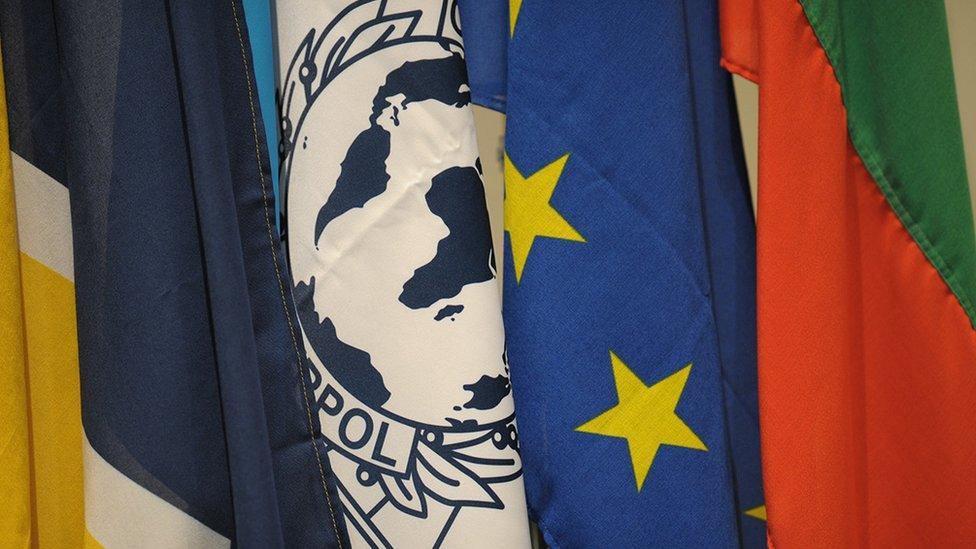UK and the EU: Security and policing
- Published

International co-operation: EU has created crime and security agencies
Stats and Facts
It's more than a quarter of a century since the Berlin Wall fell and Europe is again in the middle of a new era of global uncertainty.
The growth of cross-border crime, a web of international terror threats linked to the self-styled Islamic State and the massive movements of people to the EU's external borders all raise questions about how the nations can work together to keep people safe.
Some 800 Britons are among thousands who have gone to Syria and Iraq to fight. At least six terror plots have been stopped in Britain in 18 months. There have been 15 incidents across the EU, including the two deadly attacks in Paris.
British police receive thousands of European Arrest Warrants every year, a core measure designed to ensure suspects are returned home to face trial.
What does the EU do?
Common justice and security policies were never part of the original European plan.
Today, security co-operation is among the most important areas of the EU's work.
A recently-agreed plan forces all airlines to provide passenger information to all member states, external.
The EU is building a system so each country's police can search for DNA, fingerprint and vehicle matches on another nation's database. The UK is also connected to the EU's immigration intelligence system.
Europol, the body that co-ordinates policing and security, works on counter-terrorism planning, combating online extremism and people smuggling.
Frontex, the EU's border security agency, external, runs operations to identify and manage migrants across the Mediterranean. Another body, Eurojust, works on measures to improve co-operation between prosecutors to ensure cross-border criminals face trial.
…and what doesn't it do?
There is no EU spy agency. There is no EU police force.
The EU aspires to ever-closer union. But each nation has its own legal landscape - and nowhere is that more obvious than in security. For instance, the EU has been trying to come up with measures to combat illegal firearms , external- but the nations have wildly different gun laws.
The UK's strongest security relationship is with the United States, followed by Australia, Canada and New Zealand - although the agencies also work very closely with key European powers.
UK opt-outs of EU rules?
The UK cannot be forced to adopt any Brussels directives relating to justice and security.
Two years ago it exercised its right to pull out of more than 100 such plans. At the same time, Parliament opted to stay in 35 measures, including the European Arrest Warrant.
The UK isn't part of the Schengen free movement area that lets people cross internal borders without showing their passport.
The argument for leaving the EU
A poor record on intelligence-sharing, combined with its thinly-policed internal borders, could mean a terrorist could reach the UK via Europe. Brussels won't give up meddling in national justice and security policies.
The argument for staying in the EU
In a globalised world, cross-border security co-operation has never been more important - and the UK is playing an instrumental role in some of those arrangements.